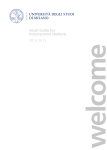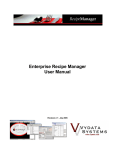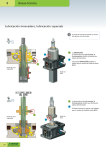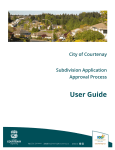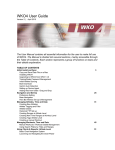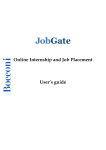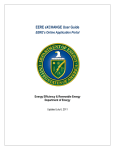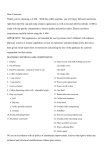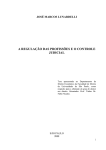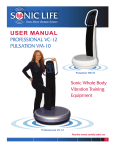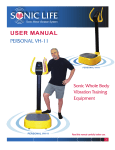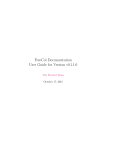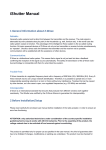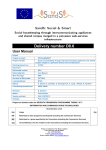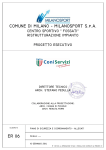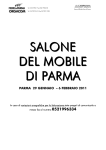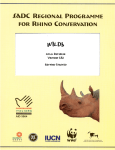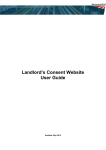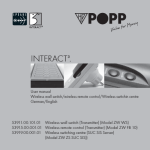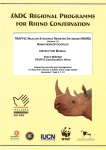Download English - Università degli Studi di Milano
Transcript
UNIVERSITÀ DEGLI STUDI DI MILANO Small Guide for International Students welcome 2015-2016 Welcome Desk – International students 5 Introduction Offices for international students The first things to do with regard to residency documents 11 Italian tax code Health insurance Residence permit Current account The first things to do at the University Students Italian language test Submission of embassy documentation Admission tests for courses with limited places Part-time enrolment Enrolment Erasmus + incoming Doctoral students Enrolment Fees Scholarships Educational and research activities supervisor Certificates, periods abroad, renewals, final examinations On-line doctoral services E-mail and log-in credentials University portal SIFA on-line service Interns Enrolment Fees Contracts and scholarships Educational and research activities supervisor Certificates, periods abroad, renewals, final examinations On-line intern services E-mail and log-in credentials University portal SIFA on-line service 2 19 Fees and scholarships 29 Enrolment fee Second instalment of fees Exemptions Scholarships The University on-line 35 The University portal E-mail and log-in credentials Unimia SIFA on-line service Payment of fees Infomail Segreterie Google, Twitter, Facebook, YouTube, Feeds Hotspots and wi-fi service Services for students 43 Accommodation and refectories Italian language courses Services for disabled students & DSA Living in Milan Getting around Transport Useful links and numbers 47 Welcome Desk International students Introduction Students who decide to study in Italy often find themselves thrown into a system and a culture very different from those of their own countries; they have to also deal with unfamiliar and sometimes complex bureaucratic procedures. It was for this reason that the Welcome Desk was created, a University service for students, doctoral students and interns who come to Milan for the first time. The service is also dedicated to those who already live in the city and need to verify the validity of academic qualifications obtained abroad in order to enrol in one of our courses. The Desk is the reference point for all the initial necessities of your new adventure in Milan and at the university. This short guide will outline the various steps you need to take in order to: • • • • obtain the documents necessary for living in Italy enrol in a course take an Italian language course take advantage of the services and opportunities offered by the University • live and get around in the city of Milan. For further information you can contact the Welcome Desk via S. Sofia, 9/1 Mon. - Wed. - Fri. from 9 a.m. to 12.00 p.m. Tue. - Thur. from 1 p.m to 3 p.m. [email protected] Suggestions • All information about the University can be found on our portal www.unimi.it. • A lot of general information – which also concerns Italian customs and lifestyle – can be found at www.universitaly.it/index.php/ website run by the Ministry of Universities and Research (MIUR). 6 Welcome Desk – International students Offices for international students Enrolment and recognition of qualifications Segreteria Studenti Internazionali (International Students Secretariat) via S. Sofia, 9/1 Mon. - Wed. - Fri. from 9 a.m. to 12.00 p.m. Tue. - Thur. from 1 p.m to 3 p.m. [email protected] To receive guidance, choose a course and discover internships and job opportunities, contact COSP - Centro per l’Orientamento allo Studio e alle Professioni (Study and Career Guidance Centre) via Santa Sofia, 9/1 Guidance: tel. +39 02 503.12113 - 12147 Internships and work placements: tel. +39 02 503.12032 fax +39 02 503.12146 [email protected] Information on EU Training Programmes Ufficio accordi e relazioni internazionali (International Agreements and Relations office) Sezione accordi in materia di formazione (Training Agreements Section) via Festa del Perdono, 7 tel. +39 02 503.13500 - 13507 fax +39 02 503.13503 [email protected] 7 Students on mobility programmes (Erasmus + and other programmes) Ufficio accordi e relazioni internazionali (International Relations office) via Festa del Perdono, 7 fax +39 02 503.13503 Incoming mobility: tel. +39 02 503.13507 [email protected] To enrol in a vocational master or an advanced course Ufficio formazione permanente e continua (Permanent Training office) via Festa del Perdono, 7 tel. +39 02.503.12093 fax +39 02.503.12300 From Monday to Friday, 9 a.m. - 12 p.m. [email protected] [email protected] Facilities for university education (scholarships, accommodations and refectories) C.I.Di.S. – Service desk via Santa Sofia, 9 tel. +39 02 58207280 fax +39 02 58207224 [email protected] 8 The first things to do with regard to residency documents In order to live in Italy, both European and non-European students are required to obtain certain official documents in order to formalize their right of residence. In view of facilitating the procedure, we have arranged the necessary information in a specific order, which we suggest you to follow step by step: in fact, you have to hold some documents before applying for others. Italian Tax code The tax code or “codice fiscale” is an identification code issued by the Ministry of Finance which is needed in order to open a current account or sign contracts. Citizens residing abroad can request it to the Italian consular-diplomatic representation in their country of residence. In Italy it can be requested from your local “Ufficio delle Entrate” (Tax office). A complete list of offices in the Lombardy region can be found on the website http://lombardia.agenziaentrate.it/. If you are a non-EU citizen, you have to take your passport and residence permit application receipt with you. Only your passport is required if you are an EU citizen or a citizen of one of the following countries: Andorra, Argentina, Australia, Bolivia, Brazil, Brunei, Canada, Chile, China, (only Hong Kong and Macau), South Korea, Costa Rica, Ecuador, El Salvador, Guatemala, Honduras, Israel, Japan, Mexico, Monaco, Nicaragua, New Zealand, Panama, Paraguay, San Marino, Singapore, USA, Vatican or Venezuela. 12 The first things to do with regard to residency documents Health insurance It is extremely important to have valid health insurance, as it is also required in order to apply for a residence permit within 8 days of your arrival in the country. Perhaps you already have health insurance, which was taken out in your home country and validated by the diplomatic representation prior to your departure. If not, the two safest options are: • voluntary registration with the Italian national health service (Servizio Sanitario Nazionale or SSN), which gives you the opportunity to choose a doctor (general practitioner), who will deal with health problems free of charge, and prescribe medicines, tests and specialist examinations when necessary. Registration is valid for one calendar year • the INA-Assitalia policy, which only covers emergency health care in public hospitals, is valid for 6-12 from the date of purchase. To register with the SSN you have to 1. go to a post office and use a payment slip to make a payment of e149.77 (cost of the service for one calendar year) to post office current account n.379222, registered to: Amministrazione P.T. Regione Lombardia, specifying the following reason for payment “Iscrizione volontaria al SSN” (which means voluntary registration to SSN). 2. registering with the local health authority (ASL or Azienda Sanitaria Locale) office nearest to your residence address (you will find all the addresses on the website www.salute.gov.it bringing with you: if you are an EU citizen: • your payment receipt • your TEAM/EHIC card or the E106 Model card issued by your country of origin 13 if you are a non-EU citizen: • your payment receipt • Italian tax code • passport • your residence permit application receipt • self-certification of residence or home • self-certification of enrolment to our University. Please note The TEAM/EHIC (European Health Insurance Card) should be requested from the local health authority of your home country prior to departure. In any event, old forms such as the E111 or E128 will still be considered valid. To take out a policy with INA-Assitalia you have to: go to a post office and make a payment of € 98.00 (for one calendar year) or € 49 (for 6 months insurance) to post office current account n. 71270003, registered to: Agenzia Generale di Roma INA-Assitalia, specifying the following reason for payment “Polizza sanitaria studenti stranieri”. 14 The first things to do with regard to residency documents Residence permit First application If you are an EU citizen, you do not require a residence permit as such, but you have to register with your local civil records office. If you live in Milan you can book an appointment on the website www. comune.milano.it > Servizi online > Servizi Anagrafici > Residenza stranieri. On the day of the appointment, you have to take the following to the civil records office: 1. your passport or identity card 2. self-certification of enrolment at our University 3. a photocopy of the documentation demonstrating the availability of adequate financial resources, for exam-ple, proof that you hold a scholarship or details of your current account 4. a copy of the receipt of payment of the health insurance valid for the whole period of your residence permit. nellʼitaliano sono solo 3 punti If you are a non-EU citizen, you have to fill in and submit the residence permit application kit. You can ask for the kit at the Welcome Desk, where someone will also be on hand to help you fill it in. It have to be submitted to a post office displaying the “Sportello amico” logo, along with: 1. 1 photocopy of your passport (only the pages with your personal details and the visa stamp) 2. documentation stating the chosen course and its duration and the stamp of the Italian diplomatic representation which issued the visa 3. a copy of the receipt of payment of the health insurance. The post office will give you an official document (lettera di convocazione) with the date of your appointment with the specific branch of the Commissariato or Ufficio Immigrazione where you have to show up. On the day of the appointment, do not forget to bring with you the original documents enclosed in the kit, the post office receipt and 2 passport size photographs. 15 Please note The closest “Sportello amico” is in Corso Italia 16, Milan (opening hours: from Monday to Saturday 8.25 a.m. - 1.35 p.m.). Renewal In order to renew your residence permit you have to fill in the application kit, specifying that it is a renewal. Deliver the kit to any post office displaying the “Sportello amico” logo, along with the following documents: 1. photocopy of your passport (only the pages with your personal details and the visa stamp) 2. a copy of your residence permit 3. a copy of the documentation demonstrating the availability of adequate financial resources, for example, proof that you hold a scholarship or details of your current account 4. a certificate of enrolment with exams taken (if you live in Milan a formal statement replacing the certificate is accepted) 5. copy of the receipt of payment of the health insurance. Please note It is advisable to begin the renewal procedure 60 days before the expiry date. Costs • € 16 for 1 revenue stamp (available at any tobacconist’s), which have to be affixed on your residence permit application • € 30 to be paid at the post office at the application acceptance • € 107,50 to be paid at the post office for the issue of an electronic residence permit. 16 The first things to do with regard to residency documents Current account To open a current account you have to: • • • • • be at least 18 years old have a valid identity document have an Italian tax code never have been subjected to bankruptcy proceedings deposit a small initial sum. Please note Most banks are open from 8.30 a.m. to 1.30 p.m. and from 3 p.m. to 4 p.m. 17 The first things to do at the University Students Italian language test If you are from a non-EU country, you have to take the Italian langua-ge test (unless you are exempt from doing so, perhaps because you hold the CELI 3 certificate - level B2 or your course is entirely in English) before enrolling in your chosen course. The test venue is available on the university website at the page www.unimi.it/ENG/courses/31192.htm and the results are shown on the “International Students” notice board at the Welcome Desk. Admission and non selective knowledge assessing tests If you have chosen a course with a limited number of places, you have to pass the admission test, before enrolling. For many other courses is mandatory (and part of the application) to take a non selective test aimed at assessing applicants knowledges in specific disciplinary field, before enrolling. It is very important to register to the test in time, following the instructions contained in the call for applications of each course published on the page of the university website www.unimi.it/ENG/courses/89365.htm Please note Non-EU students, who submitted their pre-enrolment application to the Embassy, compete for reserved places. Enrolment Candidates who have taken the exam must enrol by the dates set in the call for applications of the chosen course. If the chosen course does not require to take any admission or non selective knowledge assessing test, you can can apply directly for the enrolment within October 15th, 2015. To apply online follow these steps: • register to the Unimi portal following the link www.unimi.it/ ENG/registration.htm if you are not yet 20 The first things to do at the University • login to “Servizi online SIFA”, then select “Servizi di immatricolazione e iscrizione” > Immatricolazione/Enrolment • enter the required details and upload a photo and an identity document (jpg, png, bmp max 2 MB) • pay the first instalment of the enrolment fee (693 euros) by using your credit card (Visa or Mastercard) or by printing the MAV form downloadable at the end of the online enrolment procedure that can be paid – exclusively in Italy – at any bank agency, online banking or ATM. In order to complete the enrolment all students have to submit the required documents (listed in the Education section of our website > Application and Admission) to the International Students Desk. In any case students have to hand in: • a translated and authenticated copy of their diploma or bachelor • a copy of the declaration of value • a copy of their passport (only the pages with the personal details and the entry visa stamp). Submission of embassy documentation If you are a non european student residing abroad, remember to deliver the preapplication form of the Italian Embassy/Consulate (Form A) to the International Students office, along with the attached documents regarding your foreign qualifications. Always bring with you photocopies and original documents. Please note To enrol online, you must have an Italian tax code (codice fiscale). Suggestions If you have any doubt about the entry requirements or about the validity of your qualifications ask the Office for advice, before proceeding to enrolment process. 21 Part-time enrolment Under particular circumstances students may find part-time study most suitable to their particular needs. The University of Milan allows part-time enrolment only for reason pertaining to: • occupation • family responsibility • health or disabilities • professional artistic or sport caree Enrolling part-time allow students to nearly doubling their academic career without affecting the amount of due fees. Suggestions You will find more details in the Fee, Exemptions and Scholarship section of our website. Erasmus + incoming If you have applied at the university as part of the Erasmus + Program, you have to submit the following in person to the International Agreements and Relations office: 1. your passport or another identity document 2. two passport-size photos 3. the certificate for Erasmus students issued by your own university 4. your accident insurance certificate (it have to be valid abroad) 5. your TEAM/EHIC (European Health Insurance Card) for medical assistance. The office will help you to: • take an appointment with your academic tutor in order to discuss • details of the study plan (Learning Agreement) • obtain information regarding health care and travel cards • access the services offered by the University (e-mail address, wi-fi, library access, accommodation, refectories, Italian courses, services for disabled students), and provide information about cultural and social activities and student associations 22 The first things to do at the University • receive the free card for the Centro Universitario Sportivo (University Sports Centre). Please note On request, the University offers accommodation for Erasmus students in the university halls of residence (at a cost of € 300 per month), with use of the relative refectory services, and 60-hour language courses for all levels. Suggestions You will find full, detailed information about Erasmus trips on the pages of the portal dedicated to Incoming Students www.unimi.it/ENG/ relations/31234.htm. Doctoral students Enrolment To enrol in a doctoral course, you have to first register to the Unimi portal, then enter “Servizi online SIFA” from the banner on the home page, follow the same procedure as all students (see page 21) and submit these documents to the International Students office: 1. a copy of your degree, along with its translation and the declaration of value issued by the Italian embassy 2. a copy of your residence permit receipt 3. your Italian tax code 4. the enrolment fee payment receipt (if you do not have a scholarship). Please note The Diploma Supplement is coherent to the model devised by the Council of Europe, the European Commission and UNESCO/CEPES may be provided instead of the translation of the degree and the declaration of value. Suggestions Remember to bring with you both the original documents and the copies. 23 Fees If you have been awarded a place without a scholarship, you have to pay an enrolment fee of € 980 for the first year at the time of enrolment. The fee includes accident and civil liability insurance, which is valid for all the structures in which you will carry out authorized study and research activities. Suggestions You will find full, detailed information about fees and payment methods on the page www.unimi.it/ricerca/dottorati/18532.htm Scholarships If you have been awarded a place with a scholarship contact the Training and Research Contracts office [email protected] in order to start the payment procedures. The scholarship is paid into your current account. The payslips with details of each individual payment can be consulted at www.unimi.it/ricerca/30838.htm. Educational and research activities supervisor The supervisors of doctorate course activities are the course coordinators indicated in the competitive examination announcements. It is advisable to contact your supervisor as soon as possible in order to schedule these activities. Certificates, periods abroad, renewals, final examinations For full information regarding procedures relative to your university career (certificates, periods abroad, renewals, final examinations) go to the website www.unimi.it or visit the Doctorate Course desk of the Students Secretariat. 24 The first things to do at the University On-line doctorate course services An entire section of this guide is dedicated to on-line services, which are basically the same for all students, barring the few exceptions outlined below. E-mail and log-in credentials Doctoral students are also assigned an e-mail box with the same characteristics and levels of protection as those assigned to other students (see the University on-line section). However, in this case, the address is structured as follows: [email protected]. The address is automatically generated once the enrolment procedure has been completed. The password can then be set by visiting https:// auth.unimi.it/credenziali/. Your username (e-mail address) and password are your log-in credentials for accessing all the University’s on-line services: from SIFA services (see below), to the Institutional Research Archive (AIR), and OPAC, the University’s online catalogue. University portal Information dedicated to doctoral students can be accessed via the EDUCATION section (in the horizontal menu above the photos) > Third Cycle > Doctoral programmes. SIFA on-line service Doctoral students can take advantage of the SIFA on-line service for: • checking their personal data and administrative position • print formal statements replacing university certificates They have to use the SIFA on-line service to: • renew their enrolment • apply for admission to the final examination • pay the enrolment fees (from the second year on) or make other payments by credit card or MAV. 25 Interns Enrolment To enrol in a Specilisation School, you have to enter the “Servizi online SIFA” with the same procedure as all students (see page 21). To complete the enrolment submit these documents to the International Students office: 1. a copy of your degree, along with its translation and the declaration of value issued by the Italian embassy 2. your Italian tax code 3. a copy of your residence permit receipt 4. the Ministerial Decree validating your foreign qualifications (only for Medical Schools). Suggestions Remember to bring with you both the original documents and the copies. Fees The enrolment fee for the first year have to be paid at the time of enrolment: the portal provides details concerning the actual fees and insurance cover. Contracts and scholarships If you have been admitted to a specialisation school in the medical field you have to sign a specialist training contract. To this end, you will be contacted personally by the Training and Research Contracts office. Salaries will be paid on the 24th of each month. If you have been admitted to a specialisation school in a non-medical field, and you have been awarded a scholarship, you have to contact the Training and Research Contracts office ([email protected] or [email protected] ) in order to start the payment procedures. The scholarship will be paid in two instalments. 26 The first things to do at the University Educational and research activities supervisor The supervisor is the director of the school. It is advisable to contact the supervisor as soon as possible in order to schedule activities. Names and contact details can be found at www.unimi.it/studenti/ scuolesp/6441.htm. Certificates, periods abroad, renewals, final examinations For information about the procedures relative to your university career (certificates, periods abroad, renewals, final examinations) visit www.unimi.it/studenti/scuolesp/6024.htm or ask at the Specialisation School desk. On-line intern services An entire section of this guide is dedicated to on-line services, which are basically the same for all students, barring the few exceptions outlined below. E-mail and log-in credentials Interns are also assigned an e-mail box with the same characteristics and levels of protection as those assigned to other students (see the University on-line section). However, in this case, the address is structured as follows: [email protected]. The address is automatically generated once the enrolment procedure has been completed. The password can then be set by visiting https:// auth.unimi.it/credenziali/. Your username (e-mail address) and password are your log-in credentials for accessing all the University’s on-line services. University portal All information dedicated to interns can be accessed via the EDUCATION section (horizontal menu above the photos) > Third Cycle > Specialisation School. SIFA on-line service Interns can take advantage of the SIFA on-line service for: • checking their personal data and administrative position • print formal statements replacing university certificates. 27 Fees and scholarships Fees and scholarships Enrolment fee The enrolment fee for the first year of our courses is paid in two instalments: • the first instalment of € 693 (the same for all students) is paid immediately at the time of enrolment. • the second instalment is to be paid by 16 May 2016, and varies according to the course of study you chose and your family’s income, as shown by ISEE (University Equivalent Economic Situation Indicator) certification. Second instalment of fees If you would like the second instalment to be calculated according to your income, you have to produce documentation which declares the income and assets of all members of your family unit (for example: home, earnings, bank deposits), in relation to the calendar year 2014. The documents have to be issued by the relevant authorities of the country in which the income was earned, translated into Italian and authenticated in the manner prescribed by law. Exemptions You may be totally or partially exempted from the payment of fees: • due to disability • because you hold or are eligible for a C.I.Di.S. scholarship • because you have brothers and sisters already enrolled at the University. There are also exemptions which specifically regard foreign students: • beneficiaries of one of the 70 incentives provided by the Excellence Scholarship programme that the University awards to the best International students. • beneficiaries of scholarships from the Ministry of Foreign Affairs. 30 Fees and scholarships Suggestions Full information on exemptions can be found at the portal www.unimi.it/ENG in the section EDUCATION, following the path > Fees, exemptions, scholarships and loans > Fee exemption. Information is also available at: Sportello tasse ed esoneri (Exemptions and Fees Office) Segreterie studenti (Students Secretariat) via S. Sofia, 9/1 Mon. - Wed. - Fri. 9 a.m. to 12 p.m. Tue. - Thur. from 1 p.m to 3 p.m. Only by appointment Please note Students enrolled in medical specialisation schools do not qualify for any form of exemption, while those enrolled in specialisation schools and research doctorates only qualify for certain categories of exemption. Scholarships There are various types of scholarships, some of which are aimed specifically at foreign students. Boost your Talent To get the best out of young talents, the University of Milan offers special incentive programmes aimed at supporting highly gifted students. Among them two plans are particularly conceived for International students: • Exploit your Talent, consisting in 20 scholarhips of 10.000 euro yearly plus enrolment fee exemptions for highly talented students in any discipline open both to bachelor and master degree programmes students. • Excellence Scholarships programme that offers 100 incentive grants to the newly enrolled best International students at master level. 31 The incentives include 30 scholarships of 6.000 euro plus enrollment fee exemption, awarded to the best students chosen among the10% of each course top students, and 70 enrolment fee exemptions dedicated to the best students. Application to Exploit your Talent scholarships requires meeting the criteria specified in a competitive announcements published yearly on the page of the university website www.unimi.it/ENG/courses/33179.htm. Scholarships offered by the Italian government Intended for non-EU students, these scholarships are offered by the Italian Ministry of Foreign Affairs. To find out how to obtain a scholarship, you can contact the Italian diplomatic representation or consult the Ministry’s website at www.esteri.it/MAE/IT following the path > Services > Foreign Nationals > Work and Study Opportunities for Foreigners > Italian government Bursaries for foreign and I.R.E. students, or writing to the Ministry of Foreign Affairs: Ministero degli Affari Esteri – Direzione Generale per le Relazioni Culturali – Ufficio IX – piazzale della Farnesina, 1 - 00194 Roma. Scholarships offered by the University and the C.I.Di.S. Allocated each year to students on different years of courses, the scholarships are awarded according to merit and income, as shown by ISEE certification. The scholarships are managed and allocated by the C.I.Di.S. You have to apply on line within of every year (www.consorziocidis.it). Detailed information can be found on the portal www.unimi.it/ENG following the path EDUCATION > Fees, exemptions, scholarships and loans. Scholarships for disabled students Every year, the University awards scholarships, by means of a competitive examination, to first-year disabled students. Full information can be found in the section EDUCATION > Fees, Exemptions, Scholarships and Loans > Scholarships on the University portal www.unimi.it/ENG. 32 The University on-line The University portal www.unimi.it/ENG/ is the address of our University’s international portal. Its pages contain all the information you need. Like every website, the portal is constantly changing, but there are several fixed paths to help you find your way. The ones that regard you most directly are the EDUCATION and STUDENT SERVICES sections (both in the horizontal menu above the photos) and the Segreterie Studenti (Students Secretariat) banner on our Italian website (www.unimi.it). In the Education section you will find all the information you need about our study courses, with links to the website for each degree course and the on-line courses. The Student services section, on the other hand, offers information which is designed to help students deal with all other aspects of university life. Every month, the Segreterie studenti (Students Secretariat) section on our Italian website (www.unimi.it) highlights the most frequently requested information, regarding such things as general forms, payment forms, regulations, fees, deadlines, etc. 36 The University on-line E-mail and log-in credentials All students are assigned an e-mail box with a capacity of 150 MB. The box can be accessed with the log-in credentials received upon completion of enrolment and generated automatically within a working day. Consisting of a username and a password, your log-in credentials are also required to access UNIMIA and the SIFA on-line services, to use Infomail Segreterie, the services of the CTU (the University’s multimedia and e-Learning environment), and of the Libraries. Your username, which is also your e-mail address, is structured as follows: [email protected]. The e-mail box may be consulted and used directly via the portal www.unimi.it, by selecting “Webmail studenti” in the “ACCESSO RAPIDO” column on the right. You can change your password and resolve any problems by visiting the page www.unimi.it/studenti/posta_elettronica.htm. Please note Your University e-mail address is the sole channel for official communications. Therefore, it is essential that you regularly check and empty your email box in order to avoid over quota. 37 Unimia Unimia is a customisable “home page”, which gives you access to all the most important information concerning university (examination enrolment, results, lesson programmes and timetables), administration (administrative position, fees, benefits) and your study career (academic position, electronic record book, average examination mark). The page also allows you to use secretariat services (SIFA online) and guidance, internships and job search services (COSP). With Unimia, you can create your own personal lesson calendar, keep an eye on the syllabi that interest you, obtain information about the teaching staff and organise a directory of the most useful university websites. How to access the page Unimia can be accessed directly from the banner on our homepage or at the address unimia.unimi.it To login use your e-mail credentials. Once logged in, you will access to all students services (SIFA, Study and career guidance, payment of fees). Please note For more details, consult the user’s manual on the Unimia access page. 38 The University on-line SIFA service The on-line SIFA (Administrative and Didactic Service) service allows you to: • • • • • • check your personal data and administrative position print formal statements replacing certification of your university career enrol for examinations, courses and workshops draw up a study plan apply for exemption from payment of fees enrol for competitive examinations for the Erasmus programme and for student collaborations • calculate the second instalment of your fees by means of a simulator • pay the enrolment fees (from the second instalment on). The service can be accessed via Internet using as login your e-mail address and password. Payment of fees You can pay the enrolment fees by credit card or by MAV, using the proper online service SIFA > Gestione pagamenti. Infomail Segreterie Infomail Segreterie is an information service provided by the Students Secretariat in order to help you in case you did not find an answer to your questions in our website. The service can be accessed via our portal: www.unimi.it > Segreterie studenti: after logging-in with your email credentials, you can fill in the on-line form. Choose the category of information that interests you and send your query to the Secretariat. You will receive a prompt reply. 39 Searching with At the top right of the home page, you will find the Google search engine box, which can be used for searching in the portal and the other University websites. Keep up to date with Twitter You can keep up to date with administrative news (fees, loans, scholarships, deadlines, etc.) through Twitter. Follow us on “UNIMIsegreterie”. You can access us directly or from the home page of the portal. La “Statale” on Facebook Apart from its official Facebook page, which can be found at www. facebook.com/laStatale, our University has also a page completely dedicated to International students: www.facebook.com/University. of.Milan.There you can keep up to date with University news, take part in discussions or comment on posts. YouTube The University of Milan has its official YouTube channel www.youtube.com/user/UnimiVideo with playing list highlighting the main issues: apply, research, places, interviews, events. Feed RSS University news, announcements and press coverage are also available via RSS Feeds. Follow the link from the home page to discover how to receive the updates. 40 The University on-line Hotspots and wi-fi service The University of Milan offers the Wi-Fi service Eduroam, which is accessible by staff, professors, students and external users from federated institutions. Eduroam – which is a worldwide Wi-Fi federation of Universities and Research centers – provides a protected Wi-Fi service. This means that you can connect to Eduroam – and from there to the internet – by using a laptop and your log-in credentials. The areas which are currently covered are shown by signs. For details of coverage and how to configure your computer for access, go to www.unimi.it/ENG/student/77479.htm. 41 Services for students Accommodation and refectories In the STUDENT SERVICES section of the University portal www.unimi. it/ENG, you will find the Refectories and Accommodation subsection, which contains a full list of solutions for students: refectories, restaurants offering special deals arranged by the University and the accommodation notice boards, where you can find a bed, a room or an apartment. Most of these services are provided by the C.I.Di.S (Consortium for the Right to University Study) where you can also apply in order to get a scholarship or an accomodation in one of the university residences. C.I.Di.S. offers also facilities as refectories, library loan service, foreign language courses. Some facilities can only be accessed by partecipating to public announcements published on the Consortium website www.consorziocidis.it every year between June and July. If your stay in the city is to be a short one, or if you need a place to stay while looking for more permanent accommodation, you may be interested to know that the University has an excellent guestroom service (for information write to [email protected]) and info about hostels and B&B close to the university sites. You can also consult the website of the Province of Milan – www.visitamilano.it/turismo_en/ – which features a list of all the hotels, restaurants and pizzerias in Milan and the surrounding province. Italian language courses Enrolling at the University of Milan gives International students the opportunity to learn Italian language through three main different intensive courses: • Beginners - to reach A1/A2 level, reserved to master programmes in English and PhD students. • Intermediate - to reach B1/B2 level, for the International Medical School and Medicine and Healthcare programmes students. • Intermediate - to reach B1/B2 level for students enrolled degree programmes taught in Italian. • Courses for Erasmus students, taking place from October to December and from February to April. For information. [email protected] 44 Services for students There are however many other Italian language and culture courses, at various levels, offered by the University of Milan, and namely: • Summer courses: held between July and August in Gargnano (BS), on Lake Garda • Summer School (in cooperation with the Municipality of Milan): held in Milan for foreign teachers and promoters of Italian language and culture. • Italian language intensive courses – CALP (Cognitive Academic Language Proficiency). • Marco Polo courses, specifically dedicated to Chinese students. • Promoitals online: the first Master’s degree for Italian or foreign graduates designed to train teachers and professional figures involved in the teaching and promotion of Italian as a Second or Foreign Language. For information. Calcif www.calcif.unimi.it www.promoitals.unimi.it Suggestions Alternatively, there is also an on-line course offered by the interuniversity consortium ICON, of which our University is a member (www.italicon. it/en/index.asp) or the extremely effective courses for foreigners offered by the Municipality of Milan (www.lingueincomune.it). Services for disabled students & DSA The University of Milan provides assistance for disabled students and those affected by Learning Disability (DSA) guaranteeing transport services, learning and computer support, tutoring and assessing the possibility of taking specific educational interventions for dyslexia, and other language-based learning disabilities. Service for Disabled Students & DSA via Festa del Perdono, 7 tel. +39 02 503.12225 - 12353 fax +39 02 503.12253 [email protected] - [email protected] Suggestions You can find information about the service on the portal webpage www.unimi.it/ENG/student/31204.htm. 45 Living in Milan Getting around Milan is a strange city, as you will realize when you live here. The urban landscape is not dominated by monuments and works of art, as it is in Venice, Florence or Rome, yet there are a host of things to see and discover. Milan is perhaps most famous for fashion, for theatre and for the international scope of its trade fairs, and will become even more so in view of Expo 2015, yet it conceals many wonderful surprises: you just have to know where to look or you can simply wander around, following the advice given by the website http://milan.arounder.com/, for example, and venturing into the internal courtyards of the private palazzos in the city centre, most of which are extremely beautiful. At one time, Milan was a navigable city, though not on the same level as Venice. It was Leonardo Da Vinci who was responsible for improving the canals which linked Milan to the Ticino and the Adda, by designing a system of locks. He also left another gift to the city, the famous fresco The Last Supper. To see it, you can book on-line at www.vivaticket.it. There are the masterpieces of the Brera Picture Gallery and wonderful Romanesque churches, such as the Basilica of Sant’Ambrogio and the Basilica of Sant’Eustorgio, which is said to hold the remains of the three Magi (which Sant’Eustorgio brought back from Constantinople) and, in the centre of the city, the striking gothic structure of the Duomo, which has always been the symbol of Milan. Furthermore, there are many possibilities for excursions to the outskirts of the city, which can be planned using the information found at www.visitamilano.it/turismo_en, or on the Region’s website www. turismo.regione.lombardia.it/en/home. Milan is not far from Lake Como, Lake Maggiore and Lake Garda, the Alps, the Ligurian Sea and Venice, which is just a 2 1/2 hour train journey away. 48 Living in Milano Alternatively, you can stay in the city and visit one of the sports centres managed by the CUS, the University Sports Centre (www.cusmilano.it/ corsi) and the Municipality (www.milanosport.it/) or enjoy the Milanese nightlife, which offers everything from the increasingly popular happy hours in the city centre or by the Navigli canals to discotheques. You may also wish to go to the theatre, the cinema (where you can also see original language films) or visit one of the many museums, which are open late into the evening. For inspiration, visit www.lombardiaspettacolo.com or the Vivi Milano webpage (www.corriere.it/vivimilano/). As an alternative, you can seek advice from the Municipality of Milan’s Informagiovani service, which is based in Via Dogana 2 (close to Piazza Duomo). Transport Urban and Extra-urban transport network It is easy to travel around Milan using the public transport system, with its trams, buses and underground network. All the information you need can be found on the website of the city’s transport company, ATM (www.atm-mi.it/en), which also offers a Radiobus service, an extremely useful and convenient collective taxi. An ATM urban ticket costs € 1,50 and is valid for 90 minutes on all urban lines, though it can be used for only one journey on the underground. As a student, you can buy specially-priced monthly travel passes, which are valid for the entire urban or extra-urban network (the urban monthly pass costs € 22). The pass is available from the ATM points found at the Duomo, Cadorna, Loreto, Centrale and Romolo underground stations (open from Monday to Saturday, from 7.45 a.m. to 7.15 p.m.). You will need to take with you a colour, passport-sized photo. Pass can be requested online directly on ATM website http://www.atm.it/en/ViaggiaConNoi/Abbonamenti/Pages/Abbonamentiperglistudenti.aspx. 49 Cars, bicycles and trains Those who can’t live without a car should take a look at the Car Sharing website (www.milanocarsharing.it). You will discover that hiring a car, even for just a few hours, is not as expensive as you may think. Cycling enthusiasts who wish to explore the city on two wheels can take advantage of the bicycle hire service BikeMi (www.bikemi.com), which is provided by the Municipality of Milan, or visit the website of Ciclobby (www.ciclobby.it), an association that has been promoting bicycle travel in the city and organising group excursions for many years. For travelling outside of the city, useful websites include those of Trenitalia (www.trenitalia.com), the airports of Linate, Malpensa (www. sea-aeroportimilano.it) and Orio al Serio (www.orioaeroporto.it) and the website of the motorway service (www.autostradale.it), which contains timetables and ticket prices for the buses that link Milan to several of Italy’s most important tourist destinations. If, on the other hand, you wish to travel around Europe, you will find all the information you need on the European Youth Portal (http://europa.eu/youth/en). Suggestions If you are travelling by car or on foot and require directions, you can consult the TuttoCittà (www.tuttocitta.it/mappa/milano) or ViaMichelin (www.viamichelin.co.uk/) websites. 50 Living in Milano Useful links and numbers Emergencies It is helpful to remember that the Italian health service is public and free, in the case of emergencies. Almost every city hospital has a Casualty Department for medical emergencies. A complete list can be found on the website www.asl.milano.it. If it is impossibile for you to reach the nearest hospital you can call 118, the number of the ambulance service (www.118milano.it). If you find yourself in danger or have urgent need of protection you can request help by calling 113, the number of the State Police (www.poliziadistato.it), or 112, the number of the Carabinieri (www. carabinieri.it) or, in the event of a fire, 115, the number of the Fire Brigade (www.vigilfuoco.it). For bureaucratic matters concerning residence permits you can consult the website of Milan’s Police headquarters or Questura (http://questure. poliziadistato.it/Milano). 51 Notes Please, continue to visit our website www.unimi.it/ENG/ for updated information




















































